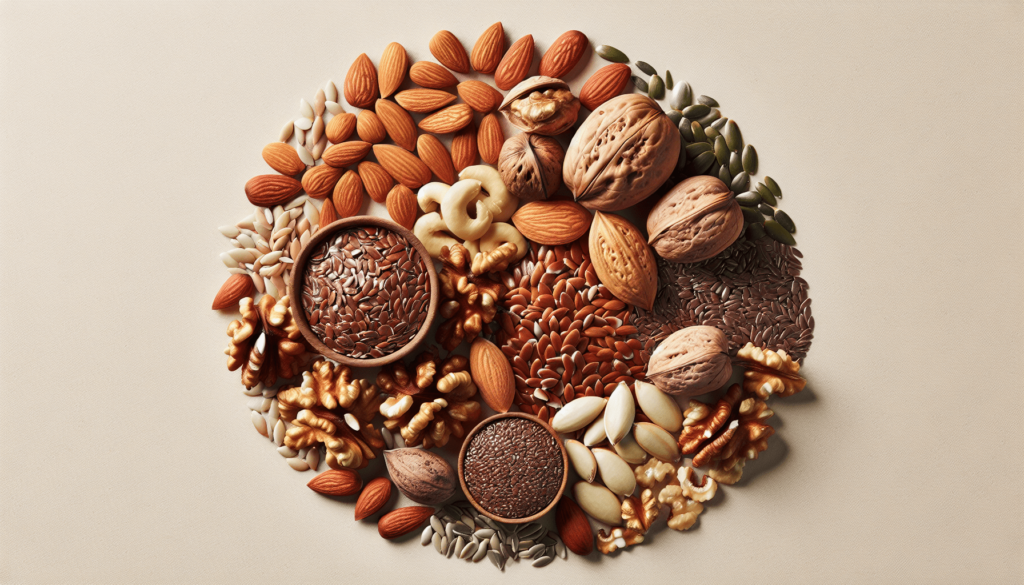Nuts and seeds are often touted for their numerous health benefits, but for individuals with gut sensitivities, they can present potential drawbacks. These individuals may experience uncomfortable symptoms such as bloating, gas, and abdominal pain after consuming nuts and seeds. While these nutritious snacks can provide essential nutrients and healthy fats, they also contain high levels of fiber and certain compounds that can be hard to digest, leading to digestive issues for those with sensitive stomachs. It is important for individuals with gut sensitivities to be aware of these potential drawbacks and consider alternative sources of nutrients that are easier on their digestive systems.

Potential Allergic Reactions
Nut and Seed Allergies
While nuts and seeds are undoubtedly a nutritious and tasty addition to a balanced diet, it’s essential to be aware of potential allergic reactions, especially if you have gut sensitivities. Nut and seed allergies are relatively common and can lead to adverse health effects. Allergic reactions occur when your immune system mistakenly identifies certain proteins in nuts and seeds as harmful invaders.
Cross-Reactivity with Pollen Allergies
If you have pollen allergies, you may be more susceptible to developing allergies to certain nuts and seeds. This phenomenon is known as cross-reactivity, where the proteins in nuts and seeds resemble those in certain pollens. For example, individuals allergic to birch pollen may also experience allergic reactions when consuming hazelnuts, almonds, or walnuts.
Symptoms of Allergic Reactions
Allergic reactions to nuts and seeds can range from mild to severe and may vary from person to person. Symptoms include itching, hives, swelling, stomach pain, nausea, vomiting, diarrhea, shortness of breath, and in extreme cases, anaphylaxis. It’s crucial to seek medical attention if you experience any of these symptoms after consuming nuts or seeds, particularly if you have a known allergy.
Digestive Issues
High Fiber Content
Nuts and seeds are often a great source of dietary fiber, which offers numerous health benefits such as promoting regular bowel movements and maintaining a healthy weight. However, for individuals with gut sensitivities, the high fiber content in nuts and seeds can pose digestion challenges. The insoluble fiber present in nuts and seeds may be difficult for some people to break down, leading to uncomfortable digestive symptoms like bloating and gas.
Phytic Acid and Digestive Enzymes
Another aspect of nuts and seeds that can affect digestion is phytic acid. Phytic acid is a naturally occurring compound found in these foods that can bind to minerals like iron, zinc, and calcium, inhibiting their absorption in the body. Additionally, some individuals may have low levels of digestive enzymes required to effectively break down the complex proteins and fats found in nuts and seeds, leading to digestive discomfort.
Difficulty in Digestion
For individuals with gut sensitivities, the combination of high fiber, phytic acid, and potential enzyme deficiencies can result in difficulty digesting nuts and seeds. This may manifest as bloating, cramping, and even diarrhea or constipation. It’s essential to pay attention to your body’s response to these foods and consider alternative protein and nutrient sources if you find they consistently cause digestive issues.
Gastrointestinal Disturbances
FODMAPs Content
FODMAPs (fermentable oligosaccharides, disaccharides, monosaccharides, and polyols) are a group of carbohydrates that can be difficult to digest for some individuals. Some nuts and seeds, such as pistachios and cashews, contain higher levels of FODMAPs, which can lead to gastrointestinal disturbances. FODMAPs can ferment in the gut, causing gas, bloating, and discomfort in sensitive individuals.
Gas and Bloating
Both nuts and seeds can produce gas in the intestines during digestion, which can result in bloating and discomfort. This is especially true if your gut is sensitive or if you consume a large quantity of nuts and seeds. If you experience excessive gas and bloating after consuming these foods, it may be helpful to reduce your portion sizes or try alternative sources of protein and healthy fats to minimize these symptoms.
Diarrhea or Constipation
Consuming nuts and seeds in large quantities or if you have pre-existing gut sensitivities may lead to diarrhea or constipation. The high fiber content, combined with the naturally occurring oils in nuts and seeds, can have a laxative effect for some individuals. Conversely, for others, the lack of adequate hydration or insufficient fiber tolerance may result in constipation. It’s important to listen to your body and adjust your intake accordingly to maintain a healthy digestive system.
Inflammatory Responses
Omega-6 Fatty Acids
While omega-6 fatty acids are essential for our overall health, an excessive intake of these fats can contribute to inflammation in the body. Many nuts and seeds naturally contain omega-6 fatty acids, which is not necessarily problematic in moderation. However, for individuals with gut sensitivities, an imbalance in the omega-3 to omega-6 ratio may exacerbate inflammation and lead to additional discomfort.
Pro-inflammatory Response
The omega-6 fatty acids found in some nuts and seeds can stimulate the production of pro-inflammatory chemicals in the body. This pro-inflammatory response may worsen existing gut sensitivities and contribute to symptoms such as abdominal pain, bloating, and inflammation in the gastrointestinal tract. It is worth noting that not all individuals will experience this response, as our bodies can react differently to various dietary components.
Imbalance in Omega-3 to Omega-6 Ratio
Maintaining a healthy balance between omega-3 and omega-6 fatty acids is crucial for optimal health. While nuts and seeds are a fantastic source of omega-3s, they also tend to have higher levels of omega-6s. For individuals with gut sensitivities, this imbalance may contribute to chronic inflammation and a disrupted gut microbiome, potentially leading to increased digestive discomfort. It’s essential to prioritize a diverse range of omega-3 sources to counterbalance the omega-6 content from nuts and seeds.

Lectins and Gut Sensitivities
Anti-Nutrients Presence
Anti-nutrients like lectins are naturally occurring compounds found in nuts and seeds that can interfere with the absorption of other essential nutrients. While lectins have the potential to disrupt gut function and contribute to gut sensitivities, the effects vary between individuals. Some people may be more sensitive to lectins and experience symptoms such as abdominal pain or changes in bowel habits, while others may not be affected.
Lectin Binding and Gut Barrier Function
Lectins have been shown to bind to the lining of the gut, potentially compromising the integrity of the gut barrier. This can lead to increased intestinal permeability, often referred to as “leaky gut.” When the gut becomes more permeable, it allows undigested food particles and other substances to enter the bloodstream, triggering an immune response and potentially leading to inflammation and digestive distress.
Increased Intestinal Permeability
Individuals with gut sensitivities may have a higher propensity for increased intestinal permeability, making them more susceptible to the effects of lectins present in nuts and seeds. Increased intestinal permeability can further exacerbate gut sensitivities, resulting in symptoms such as bloating, abdominal pain, and diarrhea. If you suspect lectins are contributing to your gut sensitivities, it may be beneficial to explore alternative protein sources that are lower in lectin content.
Oxalate Content and Kidney Stones
Oxalates in Nuts and Seeds
Certain nuts and seeds, such as almonds, cashews, and sesame seeds, contain moderate to high levels of oxalates. Oxalates are naturally occurring substances that can bind with calcium and form crystals in the kidneys, potentially leading to the formation of kidney stones. While the oxalate content in nuts and seeds is generally lower compared to other foods, those with gut sensitivities may be more prone to developing kidney stones due to impaired nutrient absorption or underlying health conditions.
Calcium Oxalate Kidney Stones
Individuals with gut sensitivities, specifically those who have an increased risk for kidney stones, need to be cautious with their nut and seed consumption. The combination of oxalates and factors such as insufficient fluid intake or impaired digestion can contribute to the formation of calcium oxalate kidney stones. If you have gut sensitivities and are concerned about kidney stone formation, it’s advisable to consult with your healthcare provider for personalized guidance.
Effects on Individuals with Gut Sensitivities
For individuals with gut sensitivities, consuming nuts and seeds with higher oxalate content may worsen existing symptoms or potentially contribute to the development of kidney stones. It’s essential to strike a balance and avoid excessive consumption of these foods if you have identified sensitivities or are prone to kidney stones. Incorporating a variety of lower-oxalate protein sources and staying well-hydrated can help mitigate potential risks.
Phytoestrogens and Hormonal Imbalances
Phytoestrogen Content in Certain Seeds
Seeds such as flaxseeds and sesame seeds contain compounds called phytoestrogens, which are plant-based estrogens that mimic the effects of estrogen in the body. While phytoestrogens can have health benefits for some individuals, those with gut sensitivities may need to exercise caution. The estrogen-like effects of phytoestrogens can potentially disrupt hormonal balance, leading to symptoms such as irregular menstruation, mood swings, or exacerbation of existing hormonal imbalances.
Estrogen-Like Effects
Phytoestrogens, when consumed in moderate amounts, may offer favorable health effects. However, in sensitive individuals, an excessive intake of phytoestrogens from seeds can result in an estrogen-like response in the body. This can disrupt the delicate balance of hormones, potentially exacerbating symptoms related to hormonal imbalances and further affecting gut health.
Impact on Hormonal Balance
Individuals with gut sensitivities and pre-existing hormonal imbalances should assess their seed consumption carefully. The hormonal impact may vary based on an individual’s overall hormonal health and sensitivity to phytoestrogens. It’s advisable to consult with a healthcare professional to determine if adjusting seed consumption or exploring alternative protein sources would be beneficial in maintaining hormonal balance while supporting gut health.
High Caloric Content
Weight Management Issues
While nuts and seeds are nutrient-dense and provide essential fats, proteins, and fiber, they are also calorie-dense. For individuals with gut sensitivities, managing caloric intake can be crucial for maintaining a healthy weight. Overconsumption of nuts and seeds, due to their high caloric content, can lead to weight gain or hinder weight loss efforts.
Excess Caloric Intake
Excessive consumption of nuts and seeds can contribute to excess calorie intake if not carefully monitored, as even a small serving can provide a significant number of calories. This is particularly relevant for individuals with gut sensitivities who may rely on nuts and seeds as primary protein sources or snack options. It’s essential to keep portions in check and incorporate a variety of nutrient-dense foods to ensure a well-balanced diet.
Potential Weight Gain
For individuals with gut sensitivities actively managing their weight, consuming large quantities of nuts and seeds may inadvertently lead to weight gain. The combination of their high caloric content, potential difficulty in digestion for some individuals, and the need for overall caloric balance must be considered. It may be helpful to seek guidance from a registered dietitian to establish an appropriate portion size and incorporate other sources of protein and healthy fats into the diet.
Potential Contamination
Aflatoxins in Nuts
Aflatoxins are naturally occurring toxins produced by certain molds, and they can contaminate certain nuts, such as peanuts, almonds, and pistachios. Aflatoxins have been linked to various health concerns, including liver damage and an increased risk of liver cancer. Individuals with gut sensitivities may have compromised liver function or weakened immune systems, making them more susceptible to the effects of aflatoxins.
Mycotoxins in Seeds
Similar to aflatoxins, mycotoxins are toxins produced by molds that can contaminate seeds, including sunflower seeds and pumpkin seeds. Mycotoxin exposure can have adverse effects on health, particularly on the liver and immune system. Individuals with gut sensitivities may be more vulnerable to mycotoxin contamination due to compromised immune function, making it important to ensure the quality and safety of seeds consumed.
Microbial Contamination
Improper storage and handling of nuts and seeds can lead to microbial contamination, such as Salmonella or E. Coli. While rare, such contamination can pose serious health risks, particularly for individuals with gut sensitivities or weakened immune systems. It’s essential to purchase nuts and seeds from reputable sources, ensure proper storage conditions, and practice good food hygiene to minimize the risk of microbial contamination.
Medication Interactions
Blood-Thinning Medications
If you are taking blood-thinning medications like warfarin or aspirin, it’s important to be mindful of your nut and seed consumption. Some nuts, such as walnuts, may contain natural compounds that can further thin the blood, potentially increasing the risk of bleeding or bruising. Individuals taking blood-thinning medications should consult with their healthcare provider to determine appropriate dietary recommendations and ensure they can safely include nuts and seeds in their diet.
Thyroid Medications
Certain nuts, such as Brazil nuts, are known for their exceptionally high selenium content. While selenium is an essential micronutrient, consuming excessive amounts can interfere with thyroid function. Individuals taking thyroid medications should monitor their nut and seed intake and consult with their healthcare provider to ensure they are within recommended levels for selenium consumption.
Potential Interactions
Medication interactions can be complex, and it’s crucial to seek guidance from a healthcare professional regarding the specific medications you are taking and their potential interactions with nuts and seeds. Some compounds found in these foods can interact with medications, altering their effectiveness or potentially causing adverse effects. Therefore, consulting with your healthcare provider can provide valuable insight regarding how nuts and seeds can fit into your overall dietary plan while taking medications.

